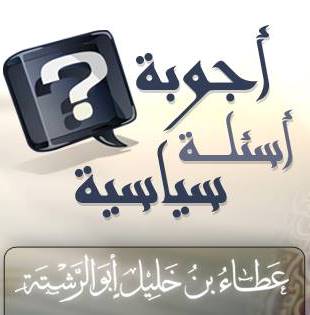
Question 1:
As-Salaam Alaikum,
May Allah protect you and support to achieve the victory for Islam. My question is: According to the definition of an ideology into a thought and a method, can the means be considered part of the thought?
Your son and brother Abdulnaser Abu Ahmad.
Question 2:
As-Salaam Alaikum Wa Rahmatullah Wa Barakaatuhu,
I have questions regarding the thought and method.
A- Are there rules (AHkam) under the thought (fikra) that has no rules in the method (tareeqa)? If the answer is yes, then are the rules that require ta’zeer punishments, for example: monopoly, cheating, Riba and the like, are left for the Ijtihad of the Imam, because the rule differs from one person to another.
B- Are there rules in the method (tareeqa) related to the individual or are the rules for the state and the community only?
And if there are no rules related to the individual, therefore what do call the treatment of the punishment of the disobedient woman by her husband, and what do call the protection of wealth and honour by the individual, and the individual jihad, and the father beating of his son after the age of ten for not praying…?
Barak Allah feek Sheikh and aid you to that which bring the good for Islam and Muslims.
Ibrahim M Bader
Answer:
Wa Alaikum us Salaam Wa Rahmatullah Wa Barakaatuhu
These two questions are similar and related, so I will answer them together:
Islam is a Fikra (thought) and Tareeqa (method). The Aqeedah and the Shariah rules which addresses man’s problems are the thought (Fikra), and the Shariah rules that explains how to implement the solutions and protects the creed, and propagates it are the method (Tareeqa).
The means are the material things that man needs in his work, in other words, they are the material tools that are used to carry out the work like a computer, and the styles are the not fixed that man uses to carry out his work, or in other words, style is a specific way to carry out the work, and it is non-permanent, like distribution of a leaflet.
Means and styles are matters of the Dunya subjected to man’s assessment, since this is its reality then it cannot be categorized under the term of thought (Fikra) nor under the term of method (tareeqah), because thought and method are fixed and are only taken from Islam. As for the means and styles, they are taken from the Muslim and from the Kaffir, and are altered as needed. Like the life sciences such as Mathematics, Physics, and the means of increasing production of fruits and trees, and manufacturing of weapons… All of these are matters of the Dunya that Islam has left for the people, a Muslim can learn it from the Muslim and from the Kaffir, because it is not related to the view point about life. Thus matters of the Dunya like styles and means and life sciences that are not related to a view point about life, do not fall under the category of Fikra and Tareeqa; this is because, as we previously mentioned that Fikra and Tareeqa are fixed and are only taken from Islam, but styles and means are taken from the Muslim and the Kaffir, they are not fixed and can be changed, just like the life sciences.
– There is no thought (Fikra) in Islam that has no method (Tareeqa) for its implementation.
– As for Ta’zeer punishments, which are punishments for sins which the Shariah did not fix a specific punishment for, but left the decision of the type of punishment for the Imam or the judge… it is from the rules of the method (Tareeqah). The fact that the Shariah did not specify the type of punishment does not at all mean that it did not place a method (Tareeqah) for the implementation of the Shariah rules, which if not followed there will be Ta’zeer punishment for; this is because the Shar’i has legislated Ta’zeer punishment and explained its details, rulings and types, and it left it up to the Imam only to choose from the various types of punishments explained by the Shar’, and according to the measure he sees fit for the reality of the sin and the reality of the sinner. i.e. the Shariah indicated how to implement these rulings (AHkam) by requesting of punishing the one who does not adhere to them, but as for the extent of punishment and type, the Shariah left it for the Imam or his deputy to decide.
– The rules of the method (Tareeqah) include those related to the state and those of the individual; so disciplining the child, chastising the disobedient wife, and some of the jihad rulings related to the individual protecting himself…they are from the rulings of the method (Tareeqah), and are related to the individual. However, the majority of rulings of the method will be related to the state, because the state itself is the method (Tareeqah) for implementing the AHkam of Islam.
Your brother,
Ata Bin Khalil Abu Al-Rashtah
11 Rabii’ Al Awwal 1436 AH
02/01/2015 CE
The link to the answer from the Ameer’s Facebook page:
